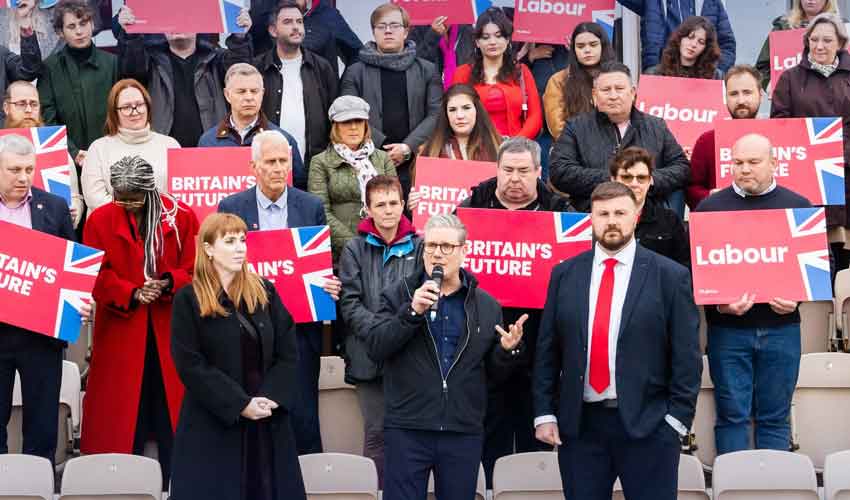With striking gains made by the Labour Party in crucial battlegrounds across England and Wales, the Conservatives are facing one of their worst local election results in forty years. These results will determine whether they win the general election.
A former minister stated that there was "no such thing really as a safe Tory seat any more" as a result of the Conservative losses, but the prime minister seemed determined to hold onto office until election day because there wasn't enough support from within his own party for him to be removed.
According to Strathclyde University polling expert Prof. John Curtice, the Conservative performance in the last 40 years has been "one of the worst, if not the worst."
After all votes are counted, the party could lose as many as 500 seats, with Labour winning in both the traditional Conservative heartlands in the south and the "red wall" north that the Tories won under Boris Johnson.
Keir Starmer celebrated "seismic" outcomes, which included capturing mayoralties in the East Midlands, North East, and North Yorkshire, which includes Sunak's own constituency, and winning a landslide by-election in Blackpool South with the third-largest swing since the Second World War.
Along with taking over at least seven new councils, including those in the southern English counties of Buckinghamshire, Essex, Hampshire, and Sussex, Labour also removed several Tory police and crime commissioners.
By 10:45pm, Starmer's party had secured over 200 additional council seats, bringing its total number of seats to over 1,000. Meanwhile, the Liberal Democrats gained 90 seats, bringing their total to 500, surpassing the Conservatives, who had lost over 370 seats to conclude with 468 seats.
However, the Green party, which won over 150 seats and just missed taking overall control of Bristol, and independent party candidates, who won 260 seats due to disenchantment with Westminster politics and Labour's Gaza policy, also made strong showings, which should serve as a warning to the major parties.
The Workers' Party of Britain, led by George Galloway, secured four seats, while the Women's Equality party secured its first-ever councillor and residents' associations secured 48 seats.
According to a national vote share prediction released by the BBC on Friday, Labour received 34% of the vote, the Conservatives received 25%, the Lib Dems received 17%, and other parties received 24%.
The Conservatives highlighted areas of success despite the government's severe defeats, such as Ben Houchen, the Tory mayor of Tees Valley, and Andy Street, who is expected to retain his mayoralty in the West Midlands on Saturday. Both men had turned away from Westminster politics associated with the Conservatives.
Additionally, there were rumours that Susan Hall, the Tory candidate for mayor of London, had run Labour's Sadiq Khan closer than expected, and that the Conservatives had very narrowly avoided losing Essex's Harlow council, which had been a Labour target.
On Friday, Sunak and Houchen made an appearance in Tees Valley, but Sunak did not discuss the larger national picture. Despite a swing in the mayoralty that suggested the opposition would have won all parliamentary seats in the region, he accused Labour of attempting to "stroll back in" to Tees Valley and declared his confidence that the voters in the area would support the Tories in a general election.
In the event that Houchen and Street were defeated, Sunak's team had prepared for the prospect of a challenge to his leadership. Tory MPs countered that the rebels had given up on trying to remove him and were instead putting the blame on him for the likely loss of this autumn's general election.
David Campbell Bannerman, the former Tory and Ukip MEP and chair of the grassroots Conservative Democratic Organisation, was the only one demanding that he step down completely. Bannerman demanded that Sunak "step aside now and go to California where he will excel in AI" and called Sunak a "terrible prime minister: not a Tory, no vision, no charisma, no campaigning ability."
Former chancellor and Conservative MP Kwasi Kwarteng stated on LBC that while there was "no such thing really as a safe Tory seat any more," he also stated that "stability and consolidation" were required, so changing leaders was not the best course of action at this time.
The Reform party, led by Richard Tice, came within 100 votes of the Tories in Blackpool South but gained no councillors. The results are likely to widen the rift within the Conservative party about whether the party should shift to the right to counteract the Reform party.
Rather than publicly endorsing Sunak, Andrea Jenkyns, the only Conservative MP to do so, has advocated for a "war reshuffle" that would reinstate former ministers Suella Braverman, Robert Jenrick, Priti Patel, and Jacob Rees-Mogg. She also suggested to GB News that Sunak try to strike a compromise with the Reform party, which did better in Blackpool South than the Conservatives, with 16.9% of the vote to 17.5%.
However, a prominent one-nation Conservative MP and former minister stated that Sunak would have to "hold his nerve" and hope that Reform loses support at a general election because this would be a "daft idea" that would force Sunak to give Labour even more centre ground.
The Queen Mary University of London politics professor Tim Bale stated: "The Conservatives are much more vulnerable to their left and their centre than to their right."
"Some Conservative MPs may perceive Reform as a threat, but the more closely they align with Reform-style policies, the fewer people they alienate on the other flank."
He added, "A lot of parliamentary seats, if they are anything like the locals, will end up going to Labour. Perhaps they weren't doing as well as in the run-up to 1997, but if you look at where they have won, they do seem to be winning in the right places - in Swindon, Milton Keynes, Thurrock, and the East Midlands mayoralty and the big swing against Ben Houchen in Tees Valley."



























